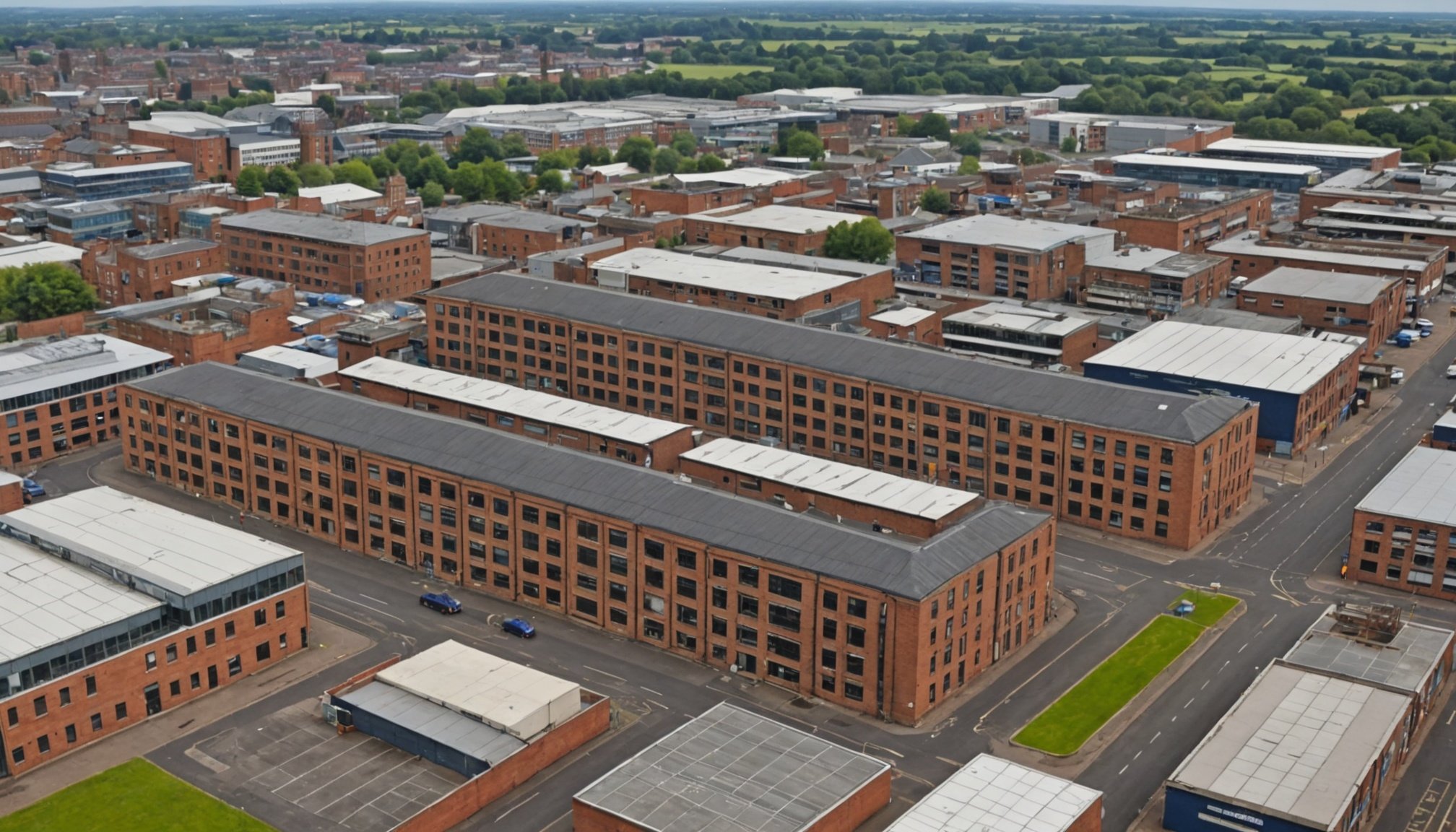Unlocking Brownfield Redevelopment Investment in the Midlands: Your Essential Funding Guide
Understanding Brownfield Land and Its Potential
Brownfield land, often referred to as previously developed land, presents a significant opportunity for urban regeneration and economic growth in the Midlands. These sites, which include former industrial areas, abandoned buildings, and other underutilized land, can be transformed into vibrant new housing developments, business hubs, and community spaces. However, the process of redeveloping these sites is often complex and requires substantial funding.
In the Midlands, particularly in the West Midlands and East Midlands, the government and local authorities are actively working to unlock the potential of brownfield land through various funding initiatives and policy changes.
Also to see : Unveiling the benefits and drawbacks of investing in birmingham”s diverse urban mixed-use projects
Funding Opportunities for Brownfield Redevelopment
The UK government has introduced several funding mechanisms to support the redevelopment of brownfield sites, especially in the Midlands.
Government Funds and Initiatives
-
Brownfield Infrastructure and Land Fund: This fund, managed by the Ministry of Housing, Communities and Local Government (MHCLG), has allocated £34 million for the West Midlands Combined Authority for the financial year 2025-2026. This funding is crucial for land remediation and infrastructure development, making brownfield sites more attractive for new housing and business ventures[1].
This might interest you : Unveiling the benefits and drawbacks of investing in real estate near uk tourist hotspots
-
Brownfield Housing Fund: With an allocation of £26,114,324 for the West Midlands, this fund aims to support the development of new homes on brownfield sites. This initiative is part of the national formula-based funding, ensuring that resources are distributed where they are most needed[1].
-
Brownfield Land Release Fund: This fund, with a new integrated settlement formula, has allocated £2,583,567 for the West Midlands. It focuses on releasing public sector land for housing development, a key strategy in the government’s plan to increase housing supply[1].
Local and Regional Initiatives
-
Devolution Deals: The Midlands region has benefited significantly from devolution deals, which grant local authorities more control over funding and decision-making. For instance, the West Midlands Combined Authority has secured a bespoke bus funding settlement, reflecting the region’s specific needs and priorities[1].
-
Private Sector Involvement: Companies like Wavensmere Homes are actively targeting brownfield land acquisitions to build new homes. For example, Wavensmere Homes aims to deliver 1,500 new homes across the South West and West Midlands through brownfield land acquisitions[2].
Practical Steps for Securing Funding
Securing funding for brownfield redevelopment involves several key steps:
Identifying Eligible Sites
- Brownfield Passports: The government has proposed the use of brownfield passports, which simplify the planning process by providing a clear pathway for development. This includes the use of local development orders (LDOs) to create area-wide planning permission for brownfield sites, making it easier for developers to get projects off the ground[3].
Preparing a Strong Application
-
Detailed Business Plan: A comprehensive business plan outlining the project’s feasibility, financial viability, and potential impact on the local community is essential. This plan should include detailed cost estimates, market analysis, and a clear timeline for the project.
-
Community Engagement: Engaging with local communities and stakeholders is crucial. It helps in building support for the project and can provide valuable insights into the needs and aspirations of the local population.
Leveraging Government and Local Support
-
Local Authorities: Working closely with local authorities can provide access to additional funding sources and support. For example, the £1 million funding boost for a new housing development on a former industrial site in Chesterfield was facilitated through local government support[4].
-
Midlands Mayor and Combined Authority: The Midlands Mayor and the Combined Authority play a significant role in advocating for regional funding and supporting local development projects. Their involvement can help in securing funding and resources from central government.
Examples of Successful Brownfield Redevelopment
Chesterfield Housing Development
A project in Chesterfield, supported by a £1 million funding boost from the Mayor, is transforming a former industrial site into a development with over 100 affordable homes. This project exemplifies how targeted funding can drive brownfield regeneration and provide much-needed housing in urban areas[5].
Wavensmere Homes Initiative
Wavensmere Homes’ ambitious plan to acquire brownfield land for 1,500 new homes across the South West and West Midlands highlights the private sector’s role in driving brownfield redevelopment. Such initiatives not only contribute to housing supply but also stimulate economic growth in the region[2].
Table: Key Funding Allocations for Brownfield Redevelopment in the West Midlands
| Functional Responsibility | Fund | Home Department | Allocation Mechanism | Funding Totals for 2025/26* |
|---|---|---|---|---|
| Housing and regeneration | Brownfield Infrastructure and Land Fund | MHCLG | Existing allocation | £34,000,000 CDEL |
| Housing and regeneration | Brownfield Housing Fund | MHCLG | National formula | £26,114,324 CDEL |
| Housing and regeneration | Brownfield Land Release Fund | MHCLG | New integrated settlement formula | £2,583,567 CDEL |
| Buildings’ retrofit | Warm Homes: Social Housing Fund | DESNZ | New integrated settlement formula | £29,172,000 CDEL |
| Local growth and Place | UK Shared Prosperity Fund | MHCLG | National formula | £32,735,765 RDEL, £13,727,835 CDEL |
*Provisional – these figures may be revised at the time of final publication.
Actionable Advice for Developers and Local Authorities
Engage with Local Communities
- Public Consultations: Conduct thorough public consultations to understand community needs and concerns. This helps in building trust and support for the project.
Collaborate with Private Sector
- Partnerships: Form partnerships with private sector companies to leverage their expertise and resources. This can accelerate the redevelopment process and bring in additional funding.
Utilize Government Initiatives
- Brownfield Passports: Take advantage of brownfield passports and local development orders to streamline the planning process.
- Devolution Deals: Work closely with local authorities and the Combined Authority to benefit from devolution deals and bespoke funding arrangements.
Focus on Economic and Social Impact
- Economic Growth: Highlight the potential economic benefits of the project, including job creation and local business support.
- Social Benefits: Emphasize the social benefits, such as providing affordable housing and improving community facilities.
Brownfield redevelopment in the Midlands is a promising avenue for economic growth, urban regeneration, and addressing housing needs. With the right funding, support from local and central government, and collaboration between public and private sectors, these projects can transform underutilized land into vibrant new communities.
As the Midlands region continues to evolve, it is crucial for developers, local authorities, and stakeholders to stay informed about the available funding opportunities and to leverage these resources effectively. By doing so, they can unlock the full potential of brownfield land and contribute to the long-term economic and social development of the region.
In the words of a local developer, “Brownfield regeneration is not just about building new homes; it’s about revitalizing communities and driving economic growth. With the right support and funding, we can make a real difference in the Midlands.”

